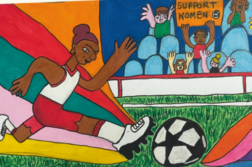Disclaimer: The opinions expressed in this article are solely of the writer and not attributable to Wessex Scene as a whole.
Racism has been a problem in football since long before I was a fan of the sport.
Whilst this is regrettable, we can’t change the past; we can only reflect on it and make changes in the present.
When football went behind closed doors in March 2020, nearly a year ago, fans were missing from games and the chants – both good and bad ones – were silenced. It was a difficult time, not least for players who rely on the fans’ backing to get them through the tough games.
However, it also led to an opportunity. An opportunity to put the infrastructure in place to make sports grounds – and not least football grounds – better spaces for everyone.
Some of the progress made in sport seems to be for show. The Black Lives Matter movement, having seeped its way into football, has lost its effect and clubs, like Brentford, have stopped taking the knee due to its triviality. Striker Ivan Toney told Sky Sports:
Everyone has had their say, and everyone agrees [that]we have been taking the knee for however long now and still nothing has changed. We are kind of being used as puppets, in my eyes; take the knee and the people at the top can rest for a while now, which is pretty silly and pretty pointless. Nothing is changing.
Toney is right. In recent weeks, footballers have come out to discuss the racism they have been subjected to via social media. It seems with fans not being able to be anonymously abusive from the stands, they are resorting to making vile comments via social networks. Anthony Martial, Lauren and Reece James, Romaine Sawyer, Marcus Rashford, Axel Tuanzebe, Yan Dhanda and Antonio Rudiger – all professional footballers who in recent weeks have had to read abuse targeted at them.
Racism should not be tolerated in sport. It isn’t a difficult concept to grasp. I can understand slightly more the issues which arise with identifying and punishing fans in a packed stadium – picking out with confidence the person who shouts an offensive slur in and amongst 70, 80 thousand fans is an immeasurably tough task. Sadly, platitudes from football clubs and footballers holding up banners do not go far enough to combat individual behaviours in stadia.
But what about now that it is being done from home? Technology is incredible. My friends can see exactly where I am on Snapchat, I can interact with anyone I choose to via Facebook, Instagram, Whatsapp. I can even get a refund if I complain hard enough on Twitter. But if I try to hide my identity, am I no longer accountable for my actions?
Many of these people sending abusive messages are, I imagine, difficult to identify because anyone can make up a social media account – and indeed as many as they like. Just set up a new email address, and off you go. No need for identity verification (bar the need to prove that you are human by clicking a box or selecting where the fire hydrants are on a grid), no need to prove anything. And suddenly you can do anything you want, with no accountability.
Social media companies are facilitating this abuse. From my view looking in, the racism is made worse by people being stuck at home. There is no risk of being caught doing what you are doing if your Twitter profile picture is an egg and you have no real details submitted. Thus, the mentality is – if no-one will catch me, I will keep doing it. Criminals – and we must begin to use that term more widely for people who abuse others – will try to hide their identities to avoid getting caught. With no need to verify who I am, I am not accountable for my actions on social media.
Social media accounts should therefore be verified by ID of some form. So many things require ID – buying alcohol, renting a new property, driving a car, taking out a loan. All things which have consequences, and consequences for which we as individuals are liable. If I needed to send a picture of my driving licence and a picture of my face in order to have the freedom of being able to use social media accounts, I would be more accountable for what I post. There’s no getting away from the fact that you posted something on social media if your account has been proven to be, well, yours.
But equally, social media accounts have to put their foot down when they know the perpetrators of said abuse. Facebook banning the account used to abuse Swansea midfielder Dhanda, 22, for a few days is frankly not enough of a punishment and demonstrates that, when these companies say they are ‘disgusted’ or ‘horrified’ by racism on their platforms, these are simply hollow box-ticking words used to keep up appearances.
Dhanda told BBC Sport about the temporary suspension of the account which abused him. He said:
You see these social media companies advertising ‘No To Racism’, ‘Kick it Out’, but, when push comes to shove and it’s the reality of people sending racist messages, they are actually doing next to nothing.
I believe they’ve banned the guy that racially abused me from sending messages for a couple of days but they’ve not taken his account off him or gone any further than that.
The fact of the matter is that taking a knee, holding a ‘Show Racism the Red Card’ banner, or being ‘disgusted’ by racism, isn’t going to change fan behaviour in football. Whilst it is difficult – but not impossible – to get rid of abuse on the terraces, it is possible for social media companies to put in place the infrastructure to make people accountable for their actions.
If Twitter can get rid of Donald Trump and Katie Hopkins – who are openly accountable for their behaviours and easily identifiable – then it is time for each company to step up and kick racism off of social media for good.



